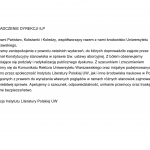Zaproszenie do publikacji w roczniku „Prace Filologiczne. Literaturoznawstwo”
Informacje ogólne
Serdecznie zapraszamy do nadsyłania artykułów do kolejnego numeru „Prac Filologicznych. Literaturoznawstwa”, który poświęcony będzie idei antologizowania i pisarstwu antologizującemu. Chcemy zainicjować i zintegrować badania, które wyzyskiwałyby współczesną wiedzę do stworzenia narzędzi metodologicznych gwarantujących rzetelny ogląd antologizowania jako procesu wielorakiej re-orientacji, kanonizacji, manipulacji, stereotypizacji, odmiennie motywowanego w różnych czasach i okolicznościach.
[For English scroll down]
ANTOLOGIE I ATOLOGIZOWANIE
Kolejny numer „Prac Filologicznych. Literaturoznawstwa” poświęcony będzie idei antologizowania i pisarstwu antologizującemu od najstarszego do współczesnego. Choć temat antologii, florilegiów pojawia się od czasu do czasu w pracach filologów, to raczej z nastawieniem na badanie jednostkowych exemplów. Antologizowanie, jako zjawisko bardzo zróżnicowane i różnorodnie uwarunkowane, zasługuje na pogłębioną i wszechstronną refleksję, wymagającą wspólnego wysiłku specjalistów wielu literaturoznawczych specjalności. Chcemy zatem zainicjować i zintegrować takie badania, które wyzyskiwałyby współczesną wiedzę do stworzenia narzędzi metodologicznych gwarantujących rzetelny ogląd antologizowania jako procesu wielorakiej re-orientacji, kanonizacji, manipulacji, stereotypizacji, odmiennie motywowanego w różnych czasach i okolicznościach. Za najważniejsze i najpilniejsze zadanie uznajemy nie tyle katalogowanie i charakteryzowanie poszczególnych antologijnych zbiorów (choć może to być cel cząstkowy czy poboczny), ile zrekonstruowanie i naukowe opracowanie rozmaitych mechanizmów antologizowania jako podstawowych dla refleksji humanistycznej i postępowania literaturoznawczego. Interesuje nas przy tym postawienie nowych pytań o pisarstwo antologizujące (czym było, jest, może/powinno być), a także o korelację między terminami antologia i antologizowanie oraz ich operacyjność.
Powyższe zagadnienia wydają się ważne zarówno z tego względu, że mamy w tym obszarze wyraźną lukę badawczą, jak i dlatego, że w ostatnich latach obserwujemy znaczny przyrost antologii jako owocu projektów naukowych. Warto tę coraz popularniejszą praktykę wesprzeć szeroko zakrojoną refleksją.
Proponujemy namysł nad następującymi kwestiami szczegółowymi, zachęcając zarazem do powiększania tego zestawu wątków problemowych:
– antologizowanie jako sztuka wyboru i jej potencjał badawczo-kulturowy;
– przedmiot antologii dawniej i dziś – od zbioru tekstów do kolekcji cyfrowej;
– historyczność celów i funkcji antologizowania; stałe i zmienne kryteria antologii;
– kulturowe, socjologiczne, polityczne konteksty wyborów antologijnych;
– biograficzne, środowiskowe, czasowe, ideologiczne i inne uwarunkowania pisarstwa antologijnego; antologia jako manifest literacki, głos pokoleniowy, akt nobilitacji, gest autoidentyfikacji;
– wypowiedzi metatekstowe na temat tworzenia antologii; paraketsty (przedmowy, posłowia) jako źródło wiedzy o warsztacie antologijnym;
– antologia a hierarchizacja, wartościowanie, przyporządkowanie, etykietowanie;
– antologizowanie jako strategia krytycznoliteracka i historycznoliteracka, praktyka teoretycznoliteracka; antologia jako deklaracja metodologiczna;
– antologia – między dziełem sztuki a sztuką interpretacji;
– znaczenie antologizowania w działalności przekładowej;
– antologia/antologizowanie i problemy edytorstwa;
– cytat w antologii, antologia cytatów, antologizowanie a cytowanie;
– edukacyjne i popularyzatorskie funkcje antologii i sposoby ich realizacji; podręczniki, wypisy szkolne, księgi upamiętniające jako antologie;
– zbiory antologijne w archiwaliach.
Zachęcamy także do nadsyłania artykułów do stałego działu „Pożytki filologiczne”, gdzie publikujemy oryginalne interpretacje utworów i przekładów albo nowe omówienia kwestii badawczych. Teksty przeznaczone do tej części pisma niekoniecznie muszą być związane z tematem przewodnim numeru.
Artykuły o objętości od 22 do 37 tysięcy znaków (razem z pojedynczymi spacjami) można składać do 15 kwietnia 2021 roku za pośrednictwem naszej strony internetowej, pod adresem https://www.journals.polon.uw.edu.pl/index.php/pfl/about/submissions. Złożenie tekstu wymaga wcześniejszej rejestracji. Prosimy w związku z tym o uważne zapoznanie się z „Informacjami dla Autorów”.
ANTHOLOGIES AND ANTHOLOGIZING
The next issue of „Prace Filologiczne. Literaturoznawstwo” (“Philological Studies. Literary Research”) is dedicated to the idea of anthologizing and also anthologized writing starting from its earliest examples and finishing with its most contemporary ones. Although the subject of anthologies and occasionally appears in philologists’ works, it is rather single case studies it refers to. And yet, the phenomenon of anthologizing as being exceptionally diverse and conditioned by multiple factors deserves to be tackled thoroughly and comprehensively and this can be achieved by means of a collective effort provided by scholars of various literary areas of expertise. Therefore our aim is to initiate and integrate studies on anthologizing which could take advantage of the state of current literary knowledge on this subject in order to devise some methodological tools that would ensure a reliable of anthologizing as a process that in a number of ways re-orients, canonizes, manipulates or stereotypes being at the same time conditioned by different times and circumstances. Crucial as it may seem, our main objective is not to index or label individual anthologies, though it might eventually turn out our secondary objective as well, but to reorganise and develop in a scholarly manner various mechanisms that influence anthologising practice as fundamental matter for humanities and literary studies. We are also interested in raising new questions about anthologised writing such as what it used to be like what it is like today, what it should be like or what correlation there is between the terms “anthology” and “anthologizing” and finally, what the value of these terms is.
All of the above seem to be essential both for the fact that there is a serious gap in the subject of anthologising and that we can observe a significant increase in publications of anthologies as a result of scholarly projects. For that reason it might turn out supportive to deliver some scholarly assistance in this particular matter.
Thus, we propose to give the following issues an incisive consideration and what is more, we invite you to extend the list below:
– anthologizing as the art of choice and its cultural and scholarly potential;
– the subject of past and present anthologies – from gathering of texts to a digital collection;
– the historicity of the aims and functions of anthologizing; fixed and variable criteria of the anthology;
– cultural, sociological and political contexts influencing the selection of literary works compiled in anthologies;
– biographical, environmental, time-related, ideological conditions and other for anthology writing; anthology as a literary manifesto, a voice of generation, an act of ennoblement and self-identification;
– metatexts referring to the process of writing an anthology;
– paratexts, e.g. preface, afterword as sources of information on the necessary skills to write anthologies;
– an anthology versus hierarchisation, valuation, matching and labelling;
– anthologizing as a literary critical and historical strategy, practice in theory of literary studies; anthology as a methodological declaration;
– an anthology – between a work of art and the art of interpretation;
– anthologizing in translation;
– an anthology/anthologizing and editing issues;
– quotation in an anthology, an anthology of quotations, anthologizing versus citing;
– educational and popularizing functions of an anthology and methods of their implementation; textbooks, chrestomathies, memorial book as anthologies;
– collections of anthologies in archives.
We also highly welcome articles for the section titled: “Philology in use”, where we publish original interpretations of short pieces of writing or translations, or innovative analyses of research matters. The articles for this section do not necessarily need to be related to the subject matter of the issue.
The articles, from 22,000 to 37,000 characters long (notes and blank spaces included), should be submitted until April 15th, 2021 via our website https://www.journals.polon.uw.edu.pl/index.php/pfl/about/submissions, registration required. It is advised to read “Author Guidelines”.


